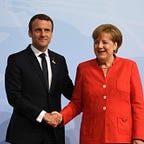Putin’s Friends
The overt actions of Putin allies culminated in a standing ovation given to Nigel Farage, from members of the AfD (Alternative for Germany) anti-immigration party.
Traffic from Russian bots have slowed in recent days and weeks, unlike in recent examples of cyber intrusions that have been calculated to maximise their effect in the final weeks of presidential campaigns (USA, France).
Since 2014, when Russian hackers seized 16 gigabytes of data from the German parliament, Germans have been wondering when Russia would release any of the emails between German lawmakers to the world.
Like the recent French elections, Russian hackers may be inclined to release thousands of documents through Wikileaks on the eve of the election. In what was perhaps a miscalculation on the part of the hackers, France had planned a media blackout in the 24 hours preceding the start of voting. That blunted the impact the document release of Emmanuel Macron campaign’s emails would have possibly had.
The similarities between the French and German elections also show that the Russian efforts at meddling can only go so far. Marine Le Pen didn’t appear to benefit significantly enough from Russian efforts, and the AfD can’t realistically expect to garner more than 10% of the vote.
In the meantime, the Russians seem to be heavily betting on another fringe party in the Czech elections. This time, SPD, led by Tomio Okamura (a Czech politician of Japanese descent), is promoting policy near and dear to the Kremlin. His absurdly xenophobic and often outright racist rhetoric is aimed at creating dissent within Czech society. He wants the Czechs to exit the EU. Money is funneled to Okamura via Putin’s paymaster Martin Nejedly. But is it Aleksandr Dugin that is advocating the support of Okamura to the Kremlin?
